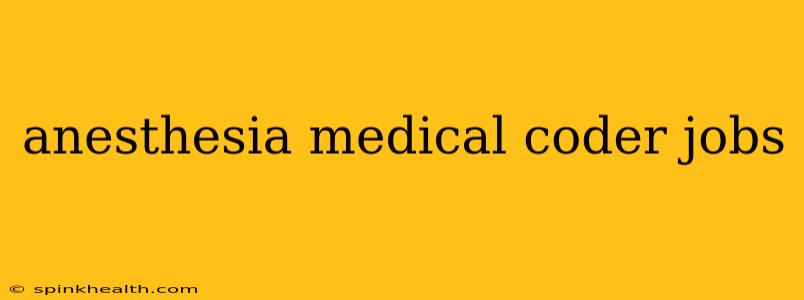The sterile scent of antiseptic, the hushed whispers of a surgical team, the rhythmic beeping of monitors – these are the soundscapes often associated with the operating room. But behind the scenes, in a world of meticulous detail and precise coding, sits another crucial element: the anesthesia medical coder. This isn't just about numbers; it's about ensuring accurate billing, smooth healthcare operations, and ultimately, the financial well-being of healthcare facilities. If you're detail-oriented, have a knack for numbers, and possess a passion for the healthcare industry, an anesthesia medical coder job might be your perfect calling.
Let's delve into the world of anesthesia medical coding, exploring the job responsibilities, required skills, and the path to securing your dream role.
What Does an Anesthesia Medical Coder Do?
An anesthesia medical coder is a highly specialized medical coder who focuses exclusively on the procedures and services provided by anesthesiologists. Imagine this: a complex surgery requiring intricate anesthesia management. It's the anesthesia medical coder's job to translate the physician's detailed notes – encompassing every medication, procedure, and complication – into standardized medical codes. These codes are then used to accurately bill insurance companies and ensure proper reimbursement for the services rendered.
Their work is crucial for:
- Accurate Billing: Ensuring the healthcare facility receives the correct payment for anesthesia services. Incorrect coding can lead to underpayment or even denial of claims.
- Financial Reporting: Contributing to the financial health of the healthcare organization through precise and timely coding.
- Data Analysis: Providing data that can be used to improve efficiency and identify trends in anesthesia services.
- Compliance: Adhering to strict regulatory guidelines and coding standards (e.g., CPT, HCPCS).
What Skills Are Essential for Anesthesia Medical Coders?
Beyond a strong understanding of medical terminology and anatomy, several key skills are vital for success in this role:
- Exceptional Attention to Detail: Anesthesia coding involves intricate details. Missing a single code or using the wrong modifier can significantly impact reimbursement.
- Strong Analytical Skills: The ability to interpret complex medical documentation and translate it accurately into codes is paramount.
- Knowledge of Anesthesia Procedures: A fundamental understanding of various anesthesia techniques and their associated codes is essential.
- Proficiency in CPT and HCPCS Coding: Mastering these coding systems is a cornerstone of the job.
- ICD-10 Coding Proficiency: Accurate diagnosis coding using the ICD-10 system is critical for complete and accurate billing.
- Computer Skills: Familiarity with Electronic Health Records (EHR) systems and medical coding software is a must.
- Problem-solving Skills: Dealing with coding discrepancies and resolving billing issues requires strong problem-solving abilities.
How to Become an Anesthesia Medical Coder?
The path to becoming a successful anesthesia medical coder usually involves:
- Education: While a formal degree isn't always required, a strong background in healthcare, medical terminology, or an associate's degree in medical coding and billing provides a significant advantage.
- Certification: Obtaining a Certified Professional Coder (CPC) or Certified Anesthesia Coder (CAC) certification demonstrates competency and enhances job prospects.
- On-the-Job Training: Many employers provide on-the-job training to refine skills and familiarize new hires with their specific systems and procedures.
- Continuing Education: The field of medical coding is constantly evolving. Staying updated with the latest coding guidelines and regulations is crucial for maintaining competency and meeting continuing education requirements for certifications.
What is the Job Outlook for Anesthesia Medical Coders?
The demand for skilled medical coders, including those specializing in anesthesia, is consistently strong. The healthcare industry is experiencing rapid growth, and accurate coding is essential for the efficient operation of hospitals, clinics, and other healthcare facilities. The Bureau of Labor Statistics projects significant growth in medical coding and billing jobs in the coming years.
What are the Salary Expectations for Anesthesia Medical Coders?
Salaries vary depending on location, experience, and certification. Generally, experienced and certified anesthesia medical coders can command competitive salaries, often exceeding the national average for medical coders.
Are there different types of Anesthesia Medical Coder jobs?
Yes, the roles can differ slightly based on the setting. You might find jobs in hospitals, ambulatory surgical centers, physician's offices, or even within billing companies that specialize in anesthesia coding. The size of the organization also influences the responsibilities; larger facilities might have specialized teams, while smaller ones could require more generalist knowledge.
What software do Anesthesia Medical Coders use?
Common software includes various Electronic Health Record (EHR) systems, specific coding software designed for medical billing, and potentially claim management systems. The specific software used will vary greatly depending on the employer.
What are the challenges faced by Anesthesia Medical Coders?
Keeping up-to-date with constant changes in coding guidelines and regulations is a significant challenge. Dealing with complex medical documentation and resolving coding ambiguities also requires significant expertise and attention to detail. Additionally, meeting tight deadlines and managing a high volume of charts are common aspects of the job.
In conclusion, a career as an anesthesia medical coder offers a blend of intellectual stimulation, meticulous work, and a significant contribution to the healthcare system. It's a field where accuracy and attention to detail are rewarded, offering a fulfilling career path for those with a passion for healthcare and a knack for numbers.

